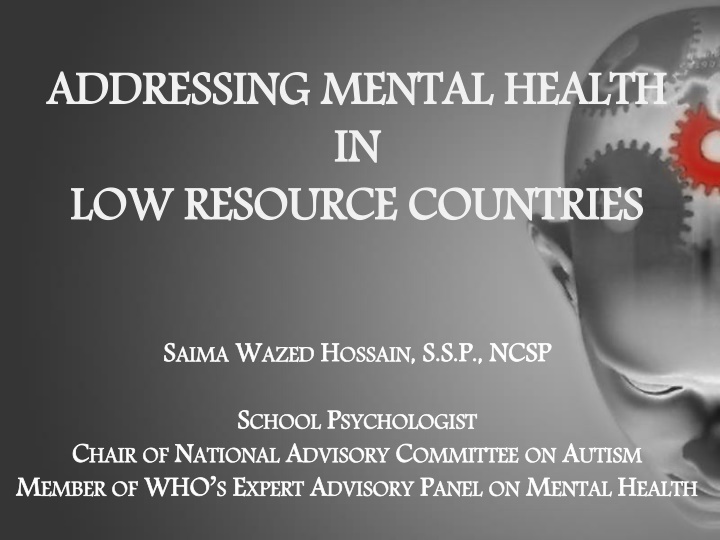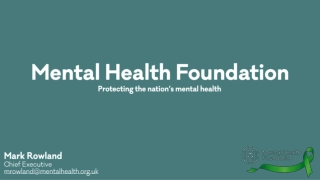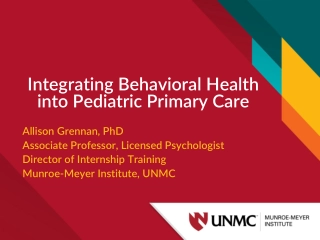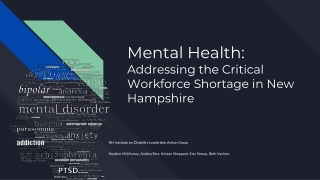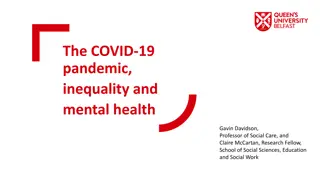Addressing Mental Health in Low Resource Countries: Challenges and Progress
This presentation sheds light on the initiatives, developments, and obstacles in addressing mental health in low resource countries, particularly focusing on Bangladesh. It discusses the evolution of mental health services, existing challenges in the referral system, prevalence of mental disorders, and data on the mental health workforce in Bangladesh.
Download Presentation

Please find below an Image/Link to download the presentation.
The content on the website is provided AS IS for your information and personal use only. It may not be sold, licensed, or shared on other websites without obtaining consent from the author.If you encounter any issues during the download, it is possible that the publisher has removed the file from their server.
You are allowed to download the files provided on this website for personal or commercial use, subject to the condition that they are used lawfully. All files are the property of their respective owners.
The content on the website is provided AS IS for your information and personal use only. It may not be sold, licensed, or shared on other websites without obtaining consent from the author.
E N D
Presentation Transcript
ADDRESSING MENTAL HEALTH IN LOW RESOURCE COUNTRIES ADDRESSING MENTAL HEALTH IN LOW RESOURCE COUNTRIES S SAIMA AIMA W WAZED AZED H HOSSAIN OSSAIN, S.S.P., , S.S.P., NCSP NCSP S SCHOOL ATIONAL A ADVISORY OF WHO CHOOL P PSYCHOLOGIST OF N NATIONAL WHO S S E EXPERT SYCHOLOGIST DVISORY C COMMITTEE XPERT A ADVISORY C CHAIR EMBER OF ON A AUTISM ON M MENTAL HAIR OF OMMITTEE ON ANEL ON UTISM ENTAL H HEALTH M MEMBER DVISORY P PANEL EALTH
STIGMA SKILLED PROFESSIONALS INFRASTRUCTURE
GLOBAL MAPPING OF ACCESS TO SERVICES (WHO-ATLAS-2005)
EVOLUTION OF MENTAL HEALTH SERVICES IN BANGLADESH Mental Health Act Act for disability rights 1912 Lunacy Act Organization of Training in Mental Health (OTMH) by Bangabandhu Sheikh Mujibur Rahman NIMH (National Institute of Mental Health) FCPS (Fellowship) and Mphil Program MD (Masters) Degree DPM (Diploma) Started at IPGMR First Psychiatric Hospital in Pabna 1979 1981 2005 2014 1957 1972 1975
EXISTING REFERRAL SYSTEM FOR MENTAL HEALTH Only 1 district has a psychiatrist Trained health workers at PHC (18000 Community Clinics, USC, UHC) Trained PHC Physicians Psychiatrist in district Hospitals Psychiatry Dept. In Nearby Medical Colleges NIMH, Dhaka Mental Hospital (Pabna)
Prevalence of Mental Disorders in Bangladesh WHO supported National Survey on Adults: 16.1% have a mental health condition(2003-2005). WHO supported National Survey on Children: 18.4% have a mental health condition (2009)
Data on Mental Health Work Force 2007 WHO - AIMS Data: Human resources working in mental health: 0.49/100,000 2014 (Bangladesh Association of Psychiatrist) Total number of Psychiatrist: 210 Clinical Psychologist: 10 Psychiatrist Social Workers: 3 General physicians trained in mental health: 7000 Nurses trained in mental health: 7200 General Physician trained in disaster management: 60 Population 156 million
Mental Health Service Centers 2007- WHO-AIMS Survey indicated: National Institute: 1 (200 beds 50 for Drug addicts) Mental hospital : 1 (500 beds) Department in Medical University : 1 (40 beds) Departments in medical colleges : 64 (0-60 beds) Total beds for mental health: 828 (0.58/100000) Treatment center for Drug Addiction: 4 (Govt.); 32 (Private) Budget Allocation in mental health: 0.44% of Health Budget 2014 Unpublished data indicates 0.25% of total Health Budget Allocated to Mental Health
MULTISECTORIAL PLANNING (since 2011) Ministries, NGOs, Universities and Training Institutes Health & Family Welfare Information & Communication Technology Social welfare Economic Relations Women & Children Affairs Information Education Labor & Employment Primary & Mass Education Local & Rural Development Youth and Sports Finance Cultural Affairs
INCREASING CAPACITY FOR DISABILITY SERVICES o First Stage: Sensitization and understanding about ALL disabilities Training teacher trainers, doctors, medical students and allied health professionals, social workers, community health workers and other community services providers o Second Stage: Specialized training on distinguishing different developmental disabilities Including information on neurodevelopmental disorders within the curriculum of medical students o Third Stage: Training of experts Training on developmental disabilities for pediatricians, psychologists, counsellors, therapists and others, parents
Achievements in Disabilities Issues: Bangladesh 2010: Center for Neurodevelopment and Autism in Children (CNAC) 2011: Regional Conference on ASD and Development Disabilities. Dhaka Declaration for Autism and Developmental Disabilities & Southeast Asian Autism Network (SAAN) 2012: Situation Analysis of Autism and Developmental Disabilities in Bangladesh (Autism, Intellectual Disabilities, Cerebral Palsy, ADHD) 2013: Survey on Autism and Neurodevelopmental Disorders by community health workers (MOHFW): .08-2.46% 2013: Disability census by MOSW (results pending)
Achievements in Mental Health Services Significantly improved Awareness in Mass media In 4 model Upazilla ALL physicians and other health professionals have been trained in mental health Manuals and training guides for PHC physicians, nurses and health workers, disaster management, family guide book etc VOLUNTARYWeekly psychiatric services to almost every district Training for health professionals, local leaders, professionals, law enforcement agencies, law makers & parents Included in several operationalplans(OP) of Directorate General of Health Services (MOHFW)
ACHIEVEMENTS IN DISABILITY POLICY Neurodevelopmental Disability Protection Trust Act 2013 Disability Rights And Protection Act 2013
PRIORITY NEEDS ENACTMENT OF MENTAL HEALTH ACT Adoption of mental health policy within existing services structures (i.e. disaster management, education curriculum) Incorporation of mental health in national health policy Standardize training & regulate ALL Mental Health professionals (only psychiatrist training is regulated and standardized) Increase budget on mental health Organize a multidisciplinary team at community centers Collaboration for sustainability Improve Accessibility to services Evidence based care: Talk therapy and medication combined most effective (Lancet, 2014)
